Yeong-Dae Kwon
MEGA-GUI: Multi-stage Enhanced Grounding Agents for GUI Elements
Nov 17, 2025Abstract:Graphical User Interface (GUI) grounding - the task of mapping natural language instructions to screen coordinates - is essential for autonomous agents and accessibility technologies. Existing systems rely on monolithic models or one-shot pipelines that lack modularity and fail under visual clutter and ambiguous instructions. We introduce MEGA-GUI, a multi-stage framework that separates grounding into coarse Region-of-Interest (ROI) selection and fine-grained element grounding, orchestrated by specialized vision-language agents. MEGA-GUI features a bidirectional ROI zoom algorithm that mitigates spatial dilution and a context-aware rewriting agent that reduces semantic ambiguity. Our analysis reveals complementary strengths and weaknesses across vision-language models at different visual scales, and we show that leveraging this modular structure achieves consistently higher accuracy than monolithic approaches. On the visually dense ScreenSpot-Pro benchmark, MEGA-GUI attains 73.18% accuracy, and on the semantically complex OSWorld-G benchmark it reaches 68.63%, surpassing previously reported results. Code and the Grounding Benchmark Toolkit (GBT) are available at https://github.com/samsungsds-research-papers/mega-gui.
Reinforcement learning to learn quantum states for Heisenberg scaling accuracy
Dec 03, 2024Abstract:Learning quantum states is a crucial task for realizing the potential of quantum information technology. Recently, neural approaches have emerged as promising methods for learning quantum states. We propose a meta-learning model that employs reinforcement learning (RL) to optimize the process of learning quantum states. For learning quantum states, our scheme trains a Hardware efficient ansatz with a blackbox optimization algorithm, called evolution strategy (ES). To enhance the efficiency of ES, a RL agent dynamically adjusts the hyperparameters of ES. To facilitate the RL training, we introduce an action repetition strategy inspired by curriculum learning. The RL agent significantly improves the sample efficiency of learning random quantum states, and achieves infidelity scaling close to the Heisenberg limit. We showcase that the RL agent trained using 3-qubit states can be generalized to learning up to 5-qubit states. These results highlight the utility of RL-driven meta-learning to enhance the efficiency and generalizability of learning quantum states. Our approach can be applicable to improve quantum control, quantum optimization, and quantum machine learning.
Less for More: Enhancing Preference Learning in Generative Language Models with Automated Self-Curation of Training Corpora
Aug 23, 2024



Abstract:Ambiguity in language presents challenges in developing more enhanced language models, particularly in preference learning, where variability among annotators results in inconsistently annotated datasets used for model alignment. To address this issue, we introduce a self-curation method that preprocesses annotated datasets by leveraging proxy models trained directly on these datasets. Our method enhances preference learning by automatically detecting and removing ambiguous annotations within the dataset. The proposed approach is validated through extensive experiments, demonstrating a marked improvement in performance across various instruction-following tasks. Our work provides a straightforward and reliable method to overcome annotation inconsistencies, serving as an initial step towards the development of more advanced preference learning techniques.
CAAP: Context-Aware Action Planning Prompting to Solve Computer Tasks with Front-End UI Only
Jun 11, 2024



Abstract:Software robots have long been deployed in Robotic Process Automation (RPA) to automate mundane and repetitive computer tasks. The advent of Large Language Models (LLMs) with advanced reasoning capabilities has set the stage for these agents to now undertake more complex and even previously unseen tasks. However, the LLM-based automation techniques in recent literature frequently rely on HTML source codes for input, limiting their application to web environments. Moreover, the information contained in HTML codes is often inaccurate or incomplete, making the agent less reliable for practical applications. We propose an LLM-based agent that functions solely on the basis of screenshots for recognizing environments, while leveraging in-context learning to eliminate the need for collecting large datasets of human demonstration. Our strategy, named Context-Aware Action Planning (CAAP) prompting encourages the agent to meticulously review the context in various angles. Through our proposed methodology, we achieve a success rate of 94.4% on 67~types of MiniWoB++ problems, utilizing only 1.48~demonstrations per problem type. Our method offers the potential for broader applications, especially for tasks that require inter-application coordination on computers or smartphones, showcasing a significant advancement in the field of automation agents. Codes and models are accessible at https://github.com/caap-agent/caap-agent.
Improving Instruction Following in Language Models through Proxy-Based Uncertainty Estimation
May 10, 2024



Abstract:Assessing response quality to instructions in language models is vital but challenging due to the complexity of human language across different contexts. This complexity often results in ambiguous or inconsistent interpretations, making accurate assessment difficult. To address this issue, we propose a novel Uncertainty-aware Reward Model (URM) that introduces a robust uncertainty estimation for the quality of paired responses based on Bayesian approximation. Trained with preference datasets, our uncertainty-enabled proxy not only scores rewards for responses but also evaluates their inherent uncertainty. Empirical results demonstrate significant benefits of incorporating the proposed proxy into language model training. Our method boosts the instruction following capability of language models by refining data curation for training and improving policy optimization objectives, thereby surpassing existing methods by a large margin on benchmarks such as Vicuna and MT-bench. These findings highlight that our proposed approach substantially advances language model training and paves a new way of harnessing uncertainty within language models.
Simulation-guided Beam Search for Neural Combinatorial Optimization
Jul 13, 2022
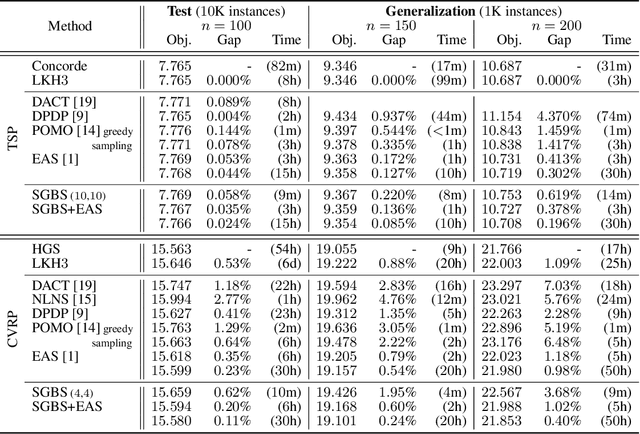
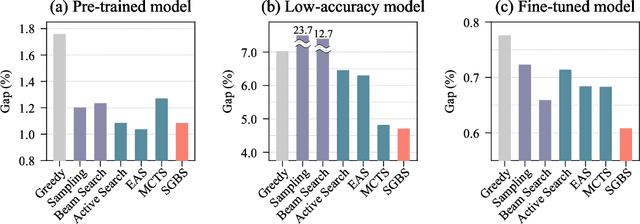
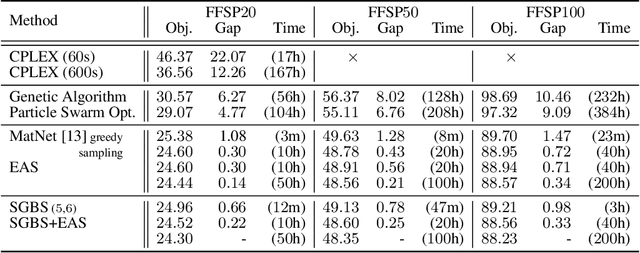
Abstract:Neural approaches for combinatorial optimization (CO) equip a learning mechanism to discover powerful heuristics for solving complex real-world problems. While neural approaches capable of high-quality solutions in a single shot are emerging, state-of-the-art approaches are often unable to take full advantage of the solving time available to them. In contrast, hand-crafted heuristics perform highly effective search well and exploit the computation time given to them, but contain heuristics that are difficult to adapt to a dataset being solved. With the goal of providing a powerful search procedure to neural CO approaches, we propose simulation-guided beam search (SGBS), which examines candidate solutions within a fixed-width tree search that both a neural net-learned policy and a simulation (rollout) identify as promising. We further hybridize SGBS with efficient active search (EAS), where SGBS enhances the quality of solutions backpropagated in EAS, and EAS improves the quality of the policy used in SGBS. We evaluate our methods on well-known CO benchmarks and show that SGBS significantly improves the quality of the solutions found under reasonable runtime assumptions.
Matrix Encoding Networks for Neural Combinatorial Optimization
Jun 21, 2021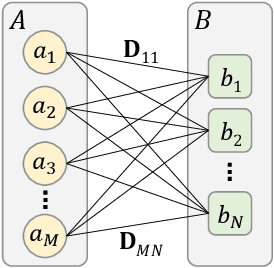
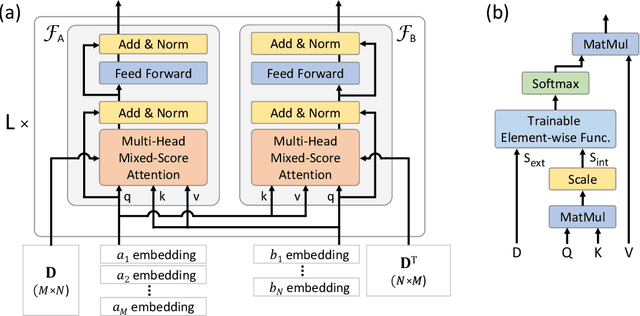
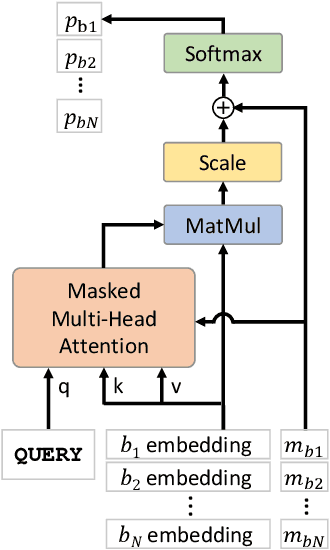
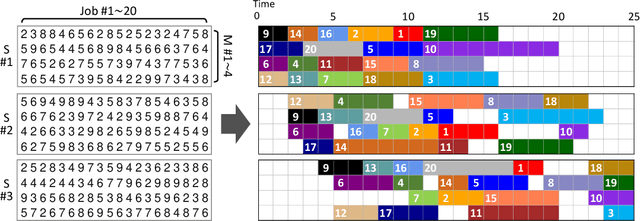
Abstract:Machine Learning (ML) can help solve combinatorial optimization (CO) problems better. A popular approach is to use a neural net to compute on the parameters of a given CO problem and extract useful information that guides the search for good solutions. Many CO problems of practical importance can be specified in a matrix form of parameters quantifying the relationship between two groups of items. There is currently no neural net model, however, that takes in such matrix-style relationship data as an input. Consequently, these types of CO problems have been out of reach for ML engineers. In this paper, we introduce Matrix Encoding Network (MatNet) and show how conveniently it takes in and processes parameters of such complex CO problems. Using an end-to-end model based on MatNet, we solve asymmetric traveling salesman (ATSP) and flexible flow shop (FFSP) problems as the earliest neural approach. In particular, for a class of FFSP we have tested MatNet on, we demonstrate a far superior empirical performance to any methods (neural or not) known to date.
Efficient Active Search for Combinatorial Optimization Problems
Jun 09, 2021
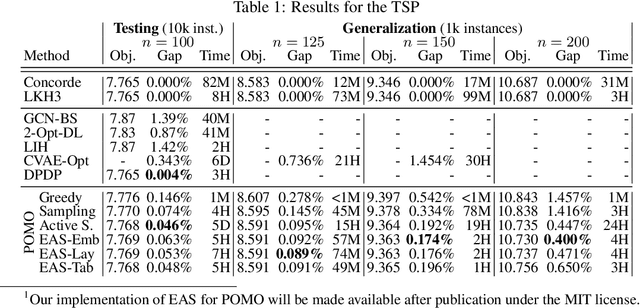
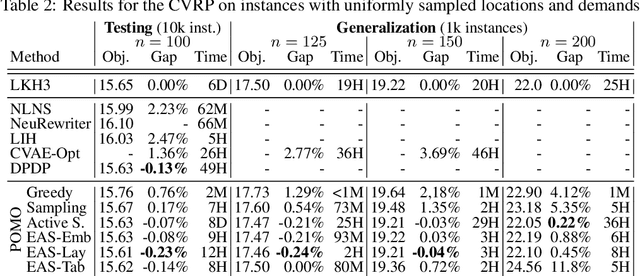

Abstract:Recently numerous machine learning based methods for combinatorial optimization problems have been proposed that learn to construct solutions in a sequential decision process via reinforcement learning. While these methods can be easily combined with search strategies like sampling and beam search, it is not straightforward to integrate them into a high-level search procedure offering strong search guidance. Bello et al. (2016) propose active search, which adjusts the weights of a (trained) model with respect to a single instance at test time using reinforcement learning. While active search is simple to implement, it is not competitive with state-of-the-art methods because adjusting all model weights for each test instance is very time and memory intensive. Instead of updating all model weights, we propose and evaluate three efficient active search strategies that only update a subset of parameters during the search. The proposed methods offer a simple way to significantly improve the search performance of a given model and outperform state-of-the-art machine learning based methods on combinatorial problems, even surpassing the well-known heuristic solver LKH3 on the capacitated vehicle routing problem. Finally, we show that (efficient) active search enables learned models to effectively solve instances that are much larger than those seen during training.
SelfMatch: Combining Contrastive Self-Supervision and Consistency for Semi-Supervised Learning
Jan 16, 2021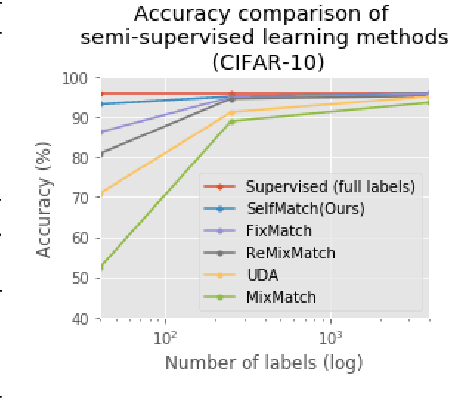
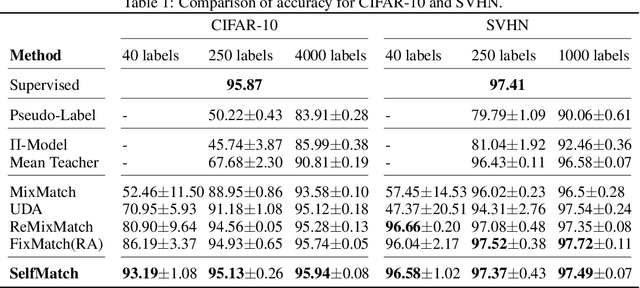
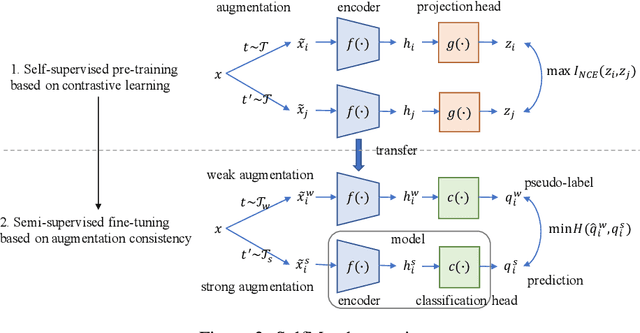

Abstract:This paper introduces SelfMatch, a semi-supervised learning method that combines the power of contrastive self-supervised learning and consistency regularization. SelfMatch consists of two stages: (1) self-supervised pre-training based on contrastive learning and (2) semi-supervised fine-tuning based on augmentation consistency regularization. We empirically demonstrate that SelfMatch achieves the state-of-the-art results on standard benchmark datasets such as CIFAR-10 and SVHN. For example, for CIFAR-10 with 40 labeled examples, SelfMatch achieves 93.19% accuracy that outperforms the strong previous methods such as MixMatch (52.46%), UDA (70.95%), ReMixMatch (80.9%), and FixMatch (86.19%). We note that SelfMatch can close the gap between supervised learning (95.87%) and semi-supervised learning (93.19%) by using only a few labels for each class.
POMO: Policy Optimization with Multiple Optima for Reinforcement Learning
Oct 30, 2020


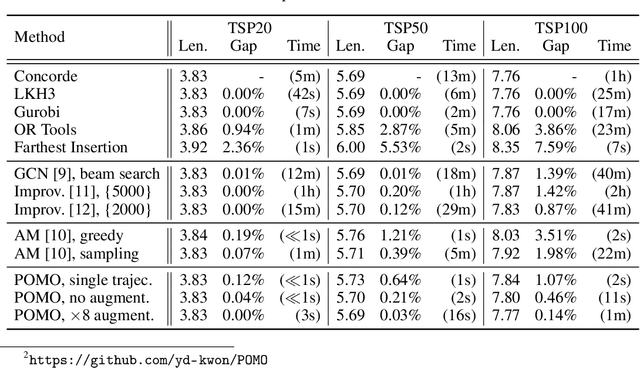
Abstract:In neural combinatorial optimization (CO), reinforcement learning (RL) can turn a deep neural net into a fast, powerful heuristic solver of NP-hard problems. This approach has a great potential in practical applications because it allows near-optimal solutions to be found without expert guides armed with substantial domain knowledge. We introduce Policy Optimization with Multiple Optima (POMO), an end-to-end approach for building such a heuristic solver. POMO is applicable to a wide range of CO problems. It is designed to exploit the symmetries in the representation of a CO solution. POMO uses a modified REINFORCE algorithm that forces diverse rollouts towards all optimal solutions. Empirically, the low-variance baseline of POMO makes RL training fast and stable, and it is more resistant to local minima compared to previous approaches. We also introduce a new augmentation-based inference method, which accompanies POMO nicely. We demonstrate the effectiveness of POMO by solving three popular NP-hard problems, namely, traveling salesman (TSP), capacitated vehicle routing (CVRP), and 0-1 knapsack (KP). For all three, our solver based on POMO shows a significant improvement in performance over all recent learned heuristics. In particular, we achieve the optimality gap of 0.14% with TSP100 while reducing inference time by more than an order of magnitude.
 Add to Chrome
Add to Chrome Add to Firefox
Add to Firefox Add to Edge
Add to Edge